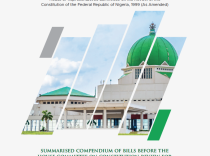On Thursday 8th December, 2016 the Deputy Senate President and Chairman of the Senate Committee on Constitution Review, Sen. Ike Ekweremadu (PDP:Enugu) proffered a personal explanation on the status of the current constitution amendment effort. These included highlights of the Committee’s work, which was inaugurated in January 2016 with a clear mandate to reprocess aspects of the Fourth Alteration Bill that had gained national consensus and enjoyed huge good-will from the general public, states, non-governmental organizations and international development organizations.
According to Sen. Ekweremadu, the committee had considered over 15 (fifteen) Constitution amendment bills, some of which had been covered in the fourth alteration bill that was not assented to by President Jonathan. However, a few others were on governance issues which he described as having “agitated the minds of Nigerians”. He also explained that some of the Bills had been clustered according to their thematic classifications which he described as follows:
- Local Government Administration: Section 7 of the Constitution is amended to provide
-A uniform 3 year tenure for elected local government council officials.
-Local governments without a democratically elected council shall not be entitled to any revenue from the Federation Account.
- Distributable Pool Account: Section 162 of the Constitution is amended to
-Provide for a national savings of 50% of oil revenues above the bench mark for a particular year and 10% of any non-oil revenue paid into the Federation Account.
-Abrogate state joint local government account and paying monies due to local government councils directly into their respective accounts.
-Define the fund of the State government that is internally generated revenue from which a portion shall be aid to the Local Government.
- Political Parties and Electoral Matters: Sections 134 (4) & (5), 179 (4) & (5) and 225 of the Constitution are amended amongst others to
– Extend the time for conducting presidential and Governorship re-run elections where no clear winner has emerged from 7 to 21 days to enable INEC plan sufficiently.
– Empower INEC to de-register political parties for non-fulfillment of certain conditions such as breach of registration requirements etc.
- Financial Autonomy of State Legislatures: Section 121 of the Constitution is amended to guarantee a first line charge funding of State Houses of Assembly from the consolidated revenue fund of the state.
- Status of the Federal Capital Territory: Sections 256, 299, 300, 301 and 302 of the Constitution are amended to create the office of an elected Mayor for the FCT with powers to administer the FCT as if it were a State of the Federation.
- Nomination of Ministers and Commissioners: Section 147 and 192 of the Constitution are amended to
-Ensure that the President and Governors designate assign portfolios to persons nominated as ministers or commissioners prior to confirmation by the Senate or State House of Assembly.
-Provide 35% representation for women in the appointment of ministers and commissioners.
- Legislature: Section 51, 67, 93 and 315 of the Constitution are amended to
-Create the National Assembly Service Commission and State House of Assembly Commission.
-Make it mandatory for the President to attend a joint meeting of the National Assembly once a year to deliver a State of the Nation Address.
- Judiciary: Sections 233, 237, 247, 251 and Part I of the Third Schedule of the constitution is amended to amongst others
– Establish a criminal division of the Federal High Court to try electoral offences, terrorism cases, economic and financial crimes cases.
-Put the Code of Conduct Tribunal under the control of the Judiciary rather than the executive.
- Devolution of Powers: The second Schedule, Part I and II of the Constitution were altered to decongest the Exclusive legislative list to give more powers to states.
- Local Government Change of Name: The first schedule to the Constitution is amended to change the names of local governments. E.g. ‘‘Afikpo North’’ to ‘‘Afikpo’’
The Deputy Senate President also requested for more time to harmonize its report with the House of Representatives and present a unified report for ease of consideration.





